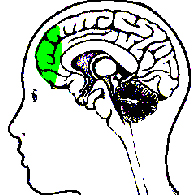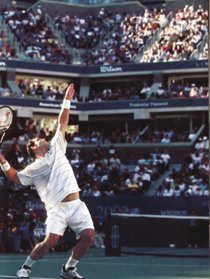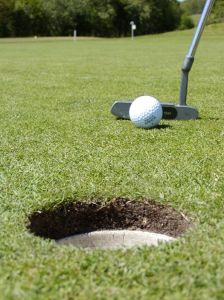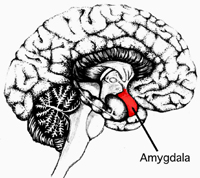Ever lose a match because you got a little tight on a critical break point? Or lose your focus and make uncharacteristic mistakes when you're trying to close out a match? Or maybe you are that rare player who doesn't think too much about the score, but still gets frustrated and negative when you're off your game.
All these problems are related to your ability to manage your anxiety and negative emotions. One line of thinking goes that the solution is to try move to a place where you play from positive feelings of confidence and fun, the ideal performance state. No doubt this is a great goal all players should strive for that produces awesome tennis.
But how often do you actually get into and maintain that state for the duration of an entire match? Most of us have glimpses of these feelings, but struggle through the majority of our competitive experience dealing with feelings of fear and uncertainty, at least at some level.
Now research on the brain suggests a completely different solution, through an ancient technique called "mindfulness." Rather than completely eliminating negative feelings, mindfulness training can help you escape their effect by changing how you focus, and increasing productive action within your brain.
The research shows that you can literally change the way your mind works and in this way make fundamental changes in your mental game. The most exciting aspect is that these changes can become permanent - by actually rewiring how your brain responds in certain situations--and this can transform who you are as player.
 |
Mindfulness has its roots in ancient traditions such as Tibetan Buddhism. |
"Mindfulness" can be defined as a deep focus in the present moment. It is the act of doing just one thing with our attention completely absorbed in an activity without judgment. Mindful breathing is the most basic technique within this practice, consisting of prolonging our attention to our breath.
The concept of course is not new. The concept of "mindfulness" comes from the East and has its roots in a variety of disciplines - namely Tibetan Buddhism, Vipassana, and Zen. Mindfulness works by strengthening the "focus" muscle in the brain - known as the pre-frontal cortex.
What researchers are finding is that by consciously shifting our attention through mindfulness we can balance the left and right hemispheres of our brain. This is critical because each hemisphere has a different task - the left hemisphere is more analytical and verbal, the right being more intuitive and visual. Playing tennis well requires a balance between the two, otherwise we can become too analytical, rigid and less instinctive. Staying calm and fluid with our strokes requires this balance.
The point is that through the practice of mindfulness we can not only create a new, balanced mind state in the moment, but also alter the way our brain looks and functions over time.
 |
The goal is balance between the left and right hemispheres. |
One of the most interesting implications of this research has to do with how we deal with anxiety. It's generally assumed that the goal is to reduce or eliminate our fears so that we can play with positive emotional energy. That's a great goal, something most players can work toward, and learn to access at times. It's sometimes called being in the zone. But eliminating anxiety isn't always possible in many or even most competitive situations in tennis.
Techniques associated with mindfulness offer a different solution to the presence of these negative thoughts and fears. Rather than eliminating them, proper focus will allow you to reduce or eliminate their impact, so that you can function at your highest level even in their presence.
When you are balanced between the two hemispheres while playing, the left hemisphere can still contribute analytic thought, but not at the expense of dominating our mental experience. With proper focus, the left brain can quickly assess what shot to hit next or how to clean up your big backswing on your return, leaving more time, for example, to orient yourself to your opponent's toss or position when returning.
 |
Mindfulness trains the prefrontal cortex, the "focus muscle." |
This seamless focus on what is "relevant" in the moment has huge performance benefits. If you find your mind drifting off the court during matches, or have a difficult time functioning when you hear the voice of your inner critic, a shift in focus may be all you need to help resolve what might seem like insurmountable problems that have plagued you for years.
Over time this kind of focus shift can actually rewire your brain to make these responses permanent. This is what leaders in neuroscience are now discovering: that our thoughts and conscious shifting of attention can act back on our brain to actually change its structure over time - not just in the moment. This possibility of impacting our wiring to reduce deeply ingrained mental habits - namely losing focus under pressure appears to be revolutionary.
I've long known the value of preparing mentally for matches with imagery and music, and the importance of managing our "monkey" mind in matches. Over the years, I've helped many players quell their critical voice, play more aggressively even though their brain tells them to play it safe, and shift their focus on demand. But, what nobody has fully known, and what is now emerging, is that a practice of mindful meditation and conscious attentional shifting can actually change the way our brain is wired in a way that can transform you as a player.
| |
Does he love the fight more than the win? |
The Nadal Example
By now, I'm sure that you, like me, are dumbfounded by Rafael Nadal's ability to concentrate and the depths of his competitive spirit. Can you imagine what Rafa's brain chemistry looks like?
Take a recent comment Nadal made after his recent win over Federer in the Australian Open. When asked by reporters about the match he said, "Maybe I like the fight more than the win."
Let's consider Nadal's statement from a neural wiring perspective as it relates to focused attention. If Nadal's focus is truly on the "battle" rather than the result as he claims - which I firmly believe it is - than it is likely that he is spending little to no mental effort trying to manage negative thoughts, negative memories or worries about what could happen. He is so engaged in the present moment, focused on what he needs to do every point to play his best. He is not allocating important psychological real estate to manage the barrage of negativity that can emerge from the common outcome-oriented mental state. Those thoughts may flash through his brain from time to time as they do with all players. The difference is Nadal is so focused that he doesn't engage them.
 |
Balanced focus in the face of Rafael Nadal. |
If you look closely at Nadal's face when he is competing, particularly his brow, he has a look of that almost appears as consternation. This facial expression represents the depth of focus that Nadal is able to generate. One can only imagine the beautiful brain circuitry that Nadal is activating in the heat of battle - decisiveness, a narrow focus on the ball, the court and Federer's patterns - all that processed, literally, in split seconds. And the outcome is the incredible high percentage execution of the most difficult shots at the most critical moments.
But let's take this one step further. Every time Nadal acts on this pattern with a mentality of "fight for every point, give up nothing", he actually deepens the connection of this particular neural network for use in the future. For example, when he chooses to hit a deep backhand crosscourt winner that makes our jaw drop open again, the brain circuitry that created this decision becomes even more accessible next time. In other words, the physical action Nadal chose will actually act back on the brain to further reinforce the connectivity between focus and execution.
Let's look at another example, but this time not Rafa, but you. You're leading 5-4 in the first set ad-out, set point, and as you crouch down to return serve your brain flips through the rolodex of possible shots that you could use to win the set. You think, "Should I block it back? Should I step in and take the offense right away? I missed my forehand long the last time I really went for it. Maybe I'll just put it in play." In the meantime, simply because you are spending too much time processing the situation, your body tightens up just a little bit. You decide to put it back in play and hope for the best. To your chagrin, your opponent, realizing that she has to win the point, takes your short blocked ball and hits a winner crosscourt.
| |
With balanced focus players process input faster with less effort. |
In comparison, it's not that Nadal isn't thinking about these sorts of tactical possibilities - rest assured he is - but the key point is that he doesn't have to work as hard mentally as most players do to process the input. He is decisive. His processing speed simply appears to be faster. A study done recently found that verbal facility and problem solving actually improve in elite athletes. Scientists Fink and Neubauer describe it like this:
"Like the expert meditator, the expert athlete, has developed the ability to do more with less. By directing attentional resources more consistently and with less possibility of engaging the attention in surrounding cognitive noise, the elite athlete maintains full, or even heightened, awareness of his or her context while simultaneously engaging in sustained on-task attention."
 |
Pete Sampras: clutch serving even with anxiety. |
Improving Focus
So how to do this? By learning to balance the halves of your brain through a disciplined focusing exercise, such as focused breathing.
It's well known that elite athletes in any sport relish pressure. They have learned to embrace their nerves and when they feel anxious they immediately think something like, "Yes, it's show time." When Pete Sampras was asked about what he missed most in the game he responded, "I miss throwing up in the locker room before the finals at Wimbledon." Elite athletes love these moments and don't let their nerves get in the way. The key point is that they have figured out that it is not the nerves that will determine their success but, rather, being able to maintain their focus in the moment and committing to the shots they believe in.
Putting studies in golf, conducted by Crews and Landers, also revealed that successful amateur golfers who were able to make putts under stressful conditions reported feeling as much anxiety as those were not able to make the shots. These reports were also confirmed with physiological measures: Heart rates of the successful golfers increased as much as those of golfers who failed to make their putts.
 |
Reduced left side brain activity correlated with better putting. |
The difference, however, was that left side brain activity was reduced in the top performers, suggesting they were able to divert mental resources to the right hemisphere as needed to complete the task. These physiological studies concluded that the less experienced athletes had higher levels of left-side activation when on task, while more experienced performers consistently exhibit balanced patterns of left-and right-side activity.
What's particularly relevant here is that many players are often both overly preoccupied with finding ways to reduce their anxiety in competition and are disturbed by these feelings. While reducing anxiety is certainly possible through consistent practice of a variety of techniques - including mindfulness training - the key to peak performance appears to lie more in our ability to manage our focus than in directly reducing our arousal levels. It's a matter of shifting our focus away from feelings that may be there, so their role is diminished. This makes sense because it is most commonly the negative thoughts and irrelevant distractions that fuel the anxiety pump in the first place.
So it is not the direct reduction of anxiety - heart rate, and blood pressure, for example - that distinguishes the elite from the rest, but our ability to shift our attention on demand. And so far, it seems, the quicker the better. This information is extremely important because it can help us begin to use our psychological resources more effectively.
 |
The Amygdala: the fear center lurking deep within the brain. |
Mental Brushfire
Without the ability to shift and sustain focus our untamed minds remain vulnerable to the compulsive thoughts that pop into our heads whenever pressure begins to emerge. It is too easy to get carried away by these thoughts and make poor choices in the middle of competition that only strengthen our bad habits when it comes to our strokes - i.e. playing tentatively and impatiently. Too often, we become victims of our thoughts and forget how we want to really hit the ball or what we practiced during the week leading up to the tournament.
A player who actually equated a first round loss with the possibility of being out on the street one day in his life away from tennis.
The mental kindling went like this: "What if my ranking drops? What if I don't get a scholarship after all this time? Then I'll have to go to a weak school. This will surely affect my chance of getting a good job. If I don't get the right job maybe my whole career will take the wrong track. Maybe I'll even be on the street one day. I have to win this match!"
| |
Learn to put out the brushfire with your breathing. |
While I know this may sound far-fetched to you, this is the kind of pressure he was placing on himself to win and improve his ranking. This kind of thinking is called the "brushfire fallacy," in which one negative thought leads to another and another. Again we can directly relate this to activity to one section of the brain, the amygdala or the fear center . In this case the fear center was overly activated, which held him captive. Then of course, his tentative play and eventual loss only strengthened this mental loop. A nasty, on going self-fulfilling prophecy.
So what did I do to help him shift this destructive thinking pattern? I had him interrupt this process with a deep breath as soon as he noticed the thoughts circulating in his head. He understood this was critical to stop the brushfire and give other brain synapses a chance to fire. He learned to focus on his breathing daily to practice "catching" these thoughts and become more aware of his tendency to focus on things not working out.
I also taught him to pull up pictures of himself playing loosely and confidently and hitting his favorite shots - which were in direct conflict with the actions he was choosing previously. I explained to him that we needed to create new mental "grooves." This is an important distinction because I believe spending too much talking about fears - beyond a certain point - can often deepen the emotion connected to the irrational thoughts.
By increasing his awareness of his negative thinking style, particularly the tendency to "brushfire", interrupting these negative thoughts, and replacing them with new pictures his concentration improved. And, to his great satisfaction and relief, he did earn that college scholarship to a division I school.
| |
Develop images of relaxed hitting in your own mind. |
Mindfulness Training
I feel confident when write about this topic because I have spent years trying to tame my own mind. Like so many players, I was prone to distraction throughout my playing career . For many years, prior to learning about how to manage the mind, shift focus, or reduce tension, I was largely a victim of my thoughts and excess tension. Far too often, I would choose to play tentatively in big moments, leaving the ball short because I wasn't able to shift my focus to positive thoughts or be decisive about my shot selection. I remember being very rattled by nerves and not knowing what to do about it.
And if you think that I have spent years meditating to get a handle on this, think again. It's not true. But, I will tell you what I have done that has made a huge difference.
I have learned to focus my attention on my breath. I focus on my breathing multiple times a day. It's now a habit. Just one or two breaths in the middle of the day, before or during a match, before a point, literally slows my mind down. I feel it immediately. My mind is free to focus on what is relevant. During the week I might breathe for 5 minutes or so a couple of times in addition to the periodic breathing throughout the day. I do yoga once a week. I also practice trying to pay attention to one thing at a time. This is what mindfulness is all about. It is not an either or proposition.
 |
Not everyone can meditate on the beach at sunset. |
I tell you this because I believe there are significant benefits even if you don't practice mindfulness breathing 20-30 minutes every day, which would be more typical of a formal meditative practice. Some people will never do this, but that doesn't mean you can't benefit tremendous from the basic process. The point is that even a little bit can go a long way. It will help you on the court to focus and play better. You will be surprised.
So here is a simple series of 4 Steps to put this into practice:
First, commit to relaxed breathing 5 minutes per day. To do this, place one hand on your abdomen and one on your chest and allow your abdomen to rise with every breath. Imagine filling a balloon up with air. This will ensure that you are taking the deep, relaxing breath necessary to create the doorway to finding your true and ability and to be able to focus and refocus as necessary.
Second, stay present off the court before your match by keeping your attention on whatever you are doing in the moment. This has been one of the most powerful mental techniques that has literally brought players focus to an entirely new level. If you are in the shower, feel the water on your body, if you are eating, taste your food. This will induce a deeper state focus and relaxation even before you walk on the court.
Third, use passive attention on the ball when returning by keeping your eyes fixated on the ball. Do not try to concentrate. Use your deep breath to relax your body and just watch the ball and get absorbed into tracking the ball from the moment your opponent steps up to the line to serve.
Fourth, when serving practice a progression I call BPR, which stands for Breath, Placement, and Relaxed Arm. First, take a deep breath as you walk to the line to establish your presence, which is accompanied by a choice of your serve. Second, briefly imagine the ball traveling toward your target in your mind. Third, scan and release excess tension from your shoulders and arm. This routine is followed by you bouncing the ball a set number of times, which is comfortable for you and the serve. Keep this routine consistent and practice it regularly so it's automatic.
| |
The serving progression: Breath, Placement, Relaxed Arm. |
Think about this: 50 years ago we didn't know that it was possible to assert control over an involuntary response such as breathing. There is something seemingly magical about being able to regulate something that is part of the autonomic nervous system. We can't directly control our heart rate or blood pressure but we can focus on our breathing as a way to affect everything else. As we train ourselves to shift our focus to our breath and stay mindful of what we are doing in the moment we strengthen our mind and generate new firing patterns in our brain.
As we shift our attention to the moment at hand, we increase the likelihood that we will play the game of tennis on our own terms. No longer do we need to be victims of random thoughts or physical sensations that shoot through our body. We can create a "pause" button that redirects our chain of thoughts to a new network that holds the key to our greatest potential and joy. As I always say, we aren't taking any of these trophies with us. But I believe we can lay our rackets down one day knowing that we responded to pressure without being held hostage to a mind that was designed largely for solving problems, not hitting a tennis ball.
1 comment:
Hi,
You have a really wonderful weblog. To become a successful person the basic point is always to have positive thinking.
Post a Comment